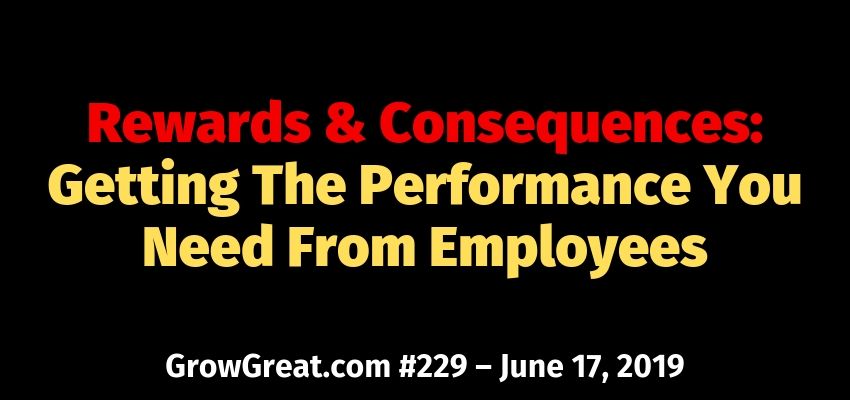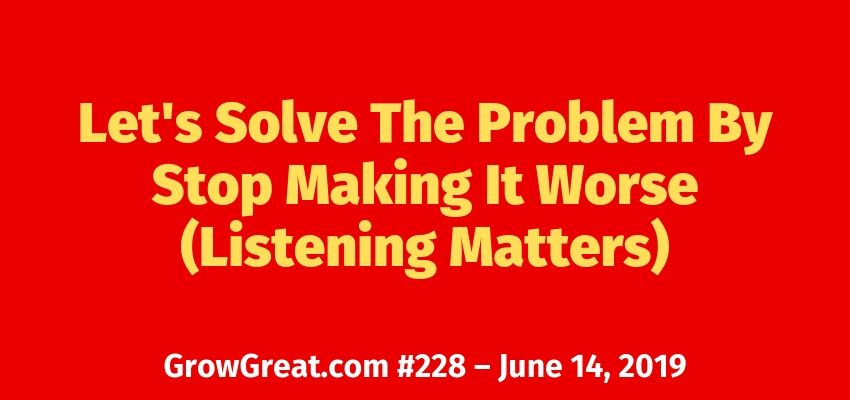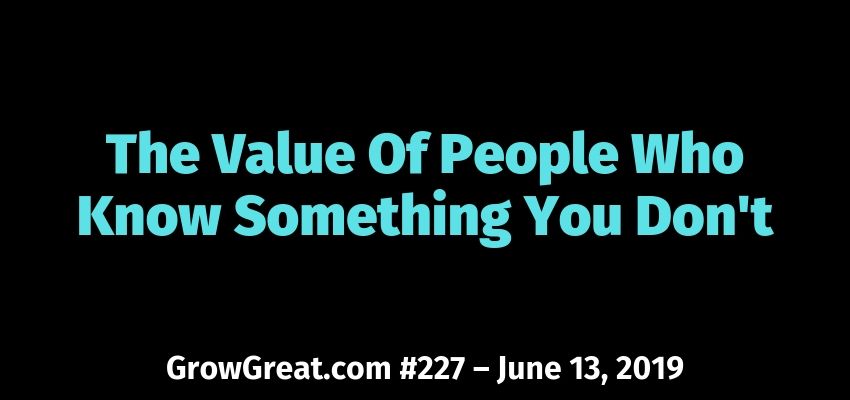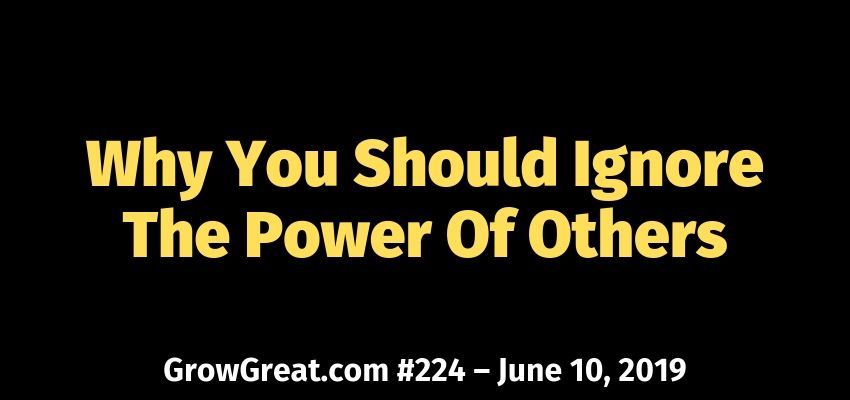Rewards & Consequences: Getting The Performance You Need From Employees – Grow Great Daily Brief #229 – June 17, 2019
Podcast: Play in new window | Download (Duration: 10:04 — 12.7MB)
Subscribe: Apple Podcasts | Spotify | RSS | More
All of us learned the proverbial truth that what you reward gets done. And that what gets measured can be improved.
The tougher lesson learned – and one I talked about a bit in the previous show – is that we sometimes get the rewards wrong. Which means we get the wrong outcomes. Who among us hasn’t experienced more than our share of, “Oops! I didn’t see that coming?” Or, “Oops! That’s not what I wanted to happen?”
Rewards and consequences matter. They can make or break the outcomes. Especially when you’re taking square aim at customer happiness! And I encourage you to make that THE aim of your business.
But rewards and consequences apply to all human behavior. It’s the whole pleasure versus pain deal. And the whole fear versus safety thing. Sad versus happy. Pick whatever Ying and Yang you prefer.
It reminds me of that scene from The Simpsons where Homer is playing hooky from work and the plant calls his house. Marge relays the message.
“The plant called. They said if you don’t come in tomorrow, don’t worry about showing up on Monday.”
Homer gleefully responds, “Whohoo! Four day weekend.” #DoesNotGetIt
Be careful the message you send…and the rewards or consequences you implement.
Creating a meritocracy is harder than it looks. But it’s worth the effort to get it right.
Thankfully today technology can help us create “what if” scenarios so we can get it closer to right straight out of the gate.
I’ll share a personal story of rewards and consequences to help get your juices going on how you might be able to implement systems that create the results you want.
Operating a luxury retail company that delivers products to customer’s homes is fraught with opportunities to mess up. Damage to customer’s homes. Damage to the products. Damage to the company equipment, including the delivery trucks. There are lots of moving parts.
Fanatism about customers drove me to try to figure out a way to reward and penalize delivery teams so we could be remarkable 100% of the time. Scratch a hardwood floor of a customer’s home a few times and you’ll understand the pain I suffered at the time.
Armed with spreadsheet data and cooperation with our warehouse/delivery manager, we figured we could earmark a percentage of the delivery fees to go toward a bonus pool for all the delivery teams (2 man teams and we had a number of them). We noodled around with it until we got it where we felt like it should be – a program that would get us closer to the ideal we were aiming for. Stellar customer experience!
Every month a portion of the gross revenue amount of the delivery fees collected from customers was put into a pool. That pool represented 100% of what would be evenly divided among the delivery teams. That was the reward.
The consequence? We would deduct any damage to customer’s homes, merchandise or equipment. Additionally, we’d track the delivery teams responsible for the damage and grade them each month. Consistently poor performing teams would likely suffer being removed from a delivery team, or being terminated. But it wasn’t a heavy-handed affair. Just candidly stated so everybody knew the rules of the game.
The potential dollars were significant. Both plus and minus. We went back and calculated what teams would be bonused taking into account the dings they’d suffer due to damages.
Our thought was positive peer pressure would be advantageous to our customers and the company. Each team would put positive pressure on each other to avoid any damages thereby giving the teams the maximum bonus amount.
At some point early on we encountered a situation we didn’t fully prepare for. The program was working like a champ. Monthly meetings were held to celebrate giving out the bonus amounts to each member of the delivery team. Results were reviewed. Challenges to make the next month even more successful were issued.
One day a delivery team left a dolly at a customer’s house. It was about a $200 dolly. They went back to where they left it and it was gone. The customer said they hadn’t seen it. (What are you going to do? Argue with a customer? No, we didn’t do that.)
The team responsible made a noble request. They wanted the $200 deducted from their bonus only. They didn’t want their teammates to pay for their mistake. I remember being impressed with the sentiment. But we held our ground and told them that everybody knew the rules going in. We only promised to tell their teammates about their request. Honestly, I don’t remember what decision we made, but it proves the point. Rewards and consequences can be very effective when you’re driving the exact behavior you want. They can backfire on you big time if you get it wrong.
Thankfully, you can always fix it.
In my experience good intentions matter. When your employees know the objective of what you’re trying to do and they know you’re wanting to incentivize them to do superior work, they’ll deliver.
You’ll figure this out IF you want to. Today, I’m urging you to think about the rewards and consequences you have in place. Monetary and otherwise. Figure out if they’re really doing what you want. Figure out what you implement that can drive performance higher. Reward it. Penalize behavior that negates what you’re after. Work with it until you get it right. Figure out what works best and make the game fun and fulfilling.
Be well. Do good. Grow great.
Randy





